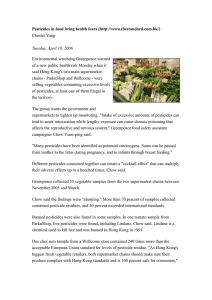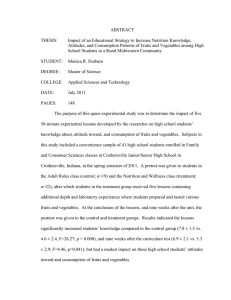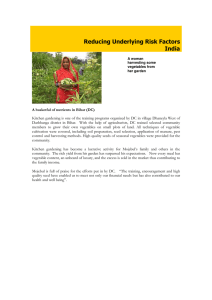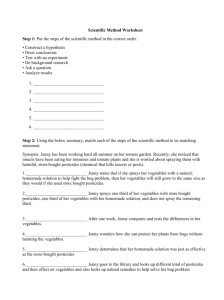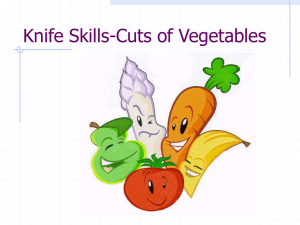Zoe Lau
advertisement
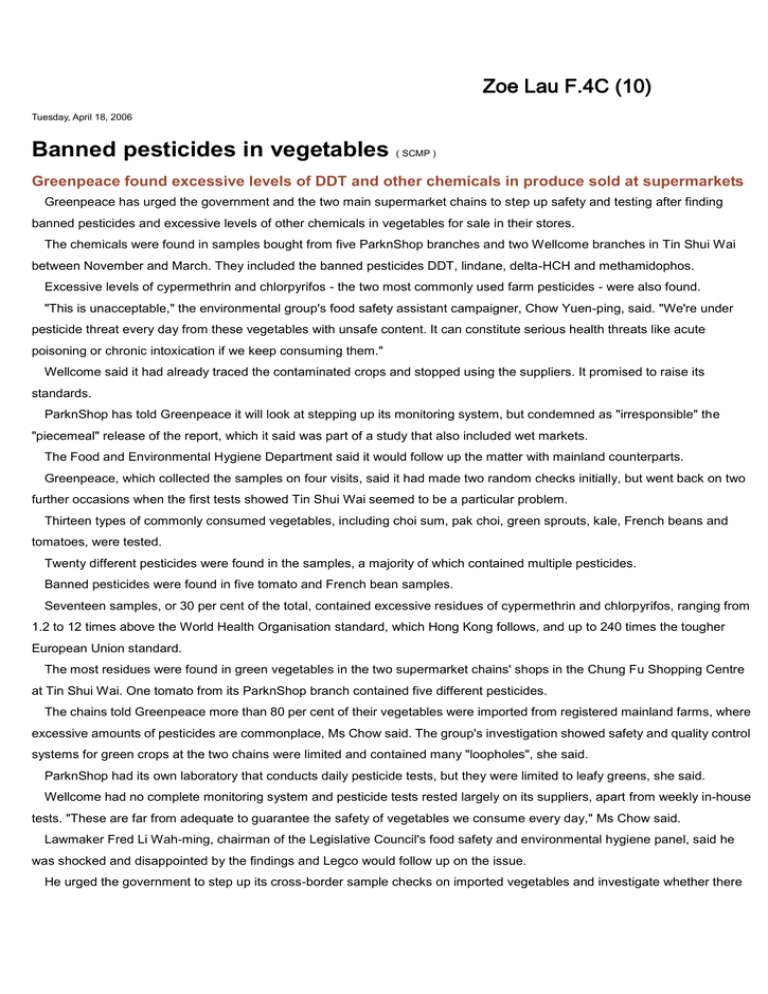
Zoe Lau F.4C (10) Tuesday, April 18, 2006 Banned pesticides in vegetables ( SCMP ) Greenpeace found excessive levels of DDT and other chemicals in produce sold at supermarkets Greenpeace has urged the government and the two main supermarket chains to step up safety and testing after finding banned pesticides and excessive levels of other chemicals in vegetables for sale in their stores. The chemicals were found in samples bought from five ParknShop branches and two Wellcome branches in Tin Shui Wai between November and March. They included the banned pesticides DDT, lindane, delta-HCH and methamidophos. Excessive levels of cypermethrin and chlorpyrifos - the two most commonly used farm pesticides - were also found. "This is unacceptable," the environmental group's food safety assistant campaigner, Chow Yuen-ping, said. "We're under pesticide threat every day from these vegetables with unsafe content. It can constitute serious health threats like acute poisoning or chronic intoxication if we keep consuming them." Wellcome said it had already traced the contaminated crops and stopped using the suppliers. It promised to raise its standards. ParknShop has told Greenpeace it will look at stepping up its monitoring system, but condemned as "irresponsible" the "piecemeal" release of the report, which it said was part of a study that also included wet markets. The Food and Environmental Hygiene Department said it would follow up the matter with mainland counterparts. Greenpeace, which collected the samples on four visits, said it had made two random checks initially, but went back on two further occasions when the first tests showed Tin Shui Wai seemed to be a particular problem. Thirteen types of commonly consumed vegetables, including choi sum, pak choi, green sprouts, kale, French beans and tomatoes, were tested. Twenty different pesticides were found in the samples, a majority of which contained multiple pesticides. Banned pesticides were found in five tomato and French bean samples. Seventeen samples, or 30 per cent of the total, contained excessive residues of cypermethrin and chlorpyrifos, ranging from 1.2 to 12 times above the World Health Organisation standard, which Hong Kong follows, and up to 240 times the tougher European Union standard. The most residues were found in green vegetables in the two supermarket chains' shops in the Chung Fu Shopping Centre at Tin Shui Wai. One tomato from its ParknShop branch contained five different pesticides. The chains told Greenpeace more than 80 per cent of their vegetables were imported from registered mainland farms, where excessive amounts of pesticides are commonplace, Ms Chow said. The group's investigation showed safety and quality control systems for green crops at the two chains were limited and contained many "loopholes", she said. ParknShop had its own laboratory that conducts daily pesticide tests, but they were limited to leafy greens, she said. Wellcome had no complete monitoring system and pesticide tests rested largely on its suppliers, apart from weekly in-house tests. "These are far from adequate to guarantee the safety of vegetables we consume every day," Ms Chow said. Lawmaker Fred Li Wah-ming, chairman of the Legislative Council's food safety and environmental hygiene panel, said he was shocked and disappointed by the findings and Legco would follow up on the issue. He urged the government to step up its cross-border sample checks on imported vegetables and investigate whether there was negligence among departments that allowed the contamination to occur. He also urged the supermarkets to conduct daily pesticide tests to ensure food safety. ParknShop said pesticide residues in its samples might be due to environmental contamination from nearby river water or wind from adjacent farms. Greenpeace confirmed it was also conducting checks on wet markets but they were not yet complete. Nausea to death, depending on the level of exposure DDT was once widely used to control insects in agriculture and malaria-carrying mosquitoes. It affects the nervous system, causing excitability, tremors and seizures. Methamidophos is one of the most toxic organophosphates. It overstimulate the nervous system, causing nausea, dizziness, confusion and, at high exposures, respiratory paralysis and death. Lindane, an organochlorine pesticide, causes liver, kidney, neurologic and immune system damage, birth defects and cancer. Delta-HCH causes blood disorders, dizziness, headaches, and changes in the levels of sex hormones. It can cause seizures and death. Chlorpyrifos is an insecticide used in homes and on farms. It can affect the nervous system, causing headaches, blurred vision, seizures, coma and death. Cypermethrin is classified by the WHO as moderately hazardous. Symptoms include abnormal facial sensations, dizziness, headache, nausea, anorexia and fatigue, vomiting and increased stomach secretion. Symptoms should disappear after days but severe exposure may cause muscular twitching, coma and convulsive attacks, with symptoms persisting for weeks. Former medical sector legislator Lo Wing-lok warned that cypermethrin could kill from severe exposure. He said the most common method to protect against exposure was to soak vegetables for at least half an hour, then wash in running water. "People are strongly advised not to drink the water used to cook vegetables as the residuals may be dissolved in it," he said. He also called on the government to step up inspection of vegetables. "The samples found with excessive residuals were not identified by the Food and Environmental Hygiene Department. It means the department has missed some unsafe food items sold in the market. So it should step up inspections," he said.?I> Staff Reporter P S2 S1 P D2 0 D1 Q Q2 Q1 Vegetables in supermarkets The chemicals were found in samples bought from five ParknShop branches and two Wellcome branches, they included the banned pesticides DDT, lindane, delta-HCH and methamidophos. The supermarkets had already stopped using the suppliers and leads to a decrease in supply of vegetables. As the buyers were afraid of the vegetables that may contain banned pesticides, the demand for vegetables in supermarkets also decrease. Since the decrease in supply and the decrease in demand of vegetables in supermarkets are the same, there is no change in equilibrium price but a decrease in equilibrium quantity of vegetables in ParknShop and Wellcome. P S P2 P1 D1 0 D1 Q Q1 Q2 Vegetables in markets Vegetables in markets and vegetables in supermarkets are substitutes. That means they can replace by each other. As now Greenpeace found excessive levels of DDT and other chemicals in produce sold at supermarkets, the demand for vegetables in markets will increase. There will be an increase in both equilibrium price and equilibrium quantity of vegetables in markets.
